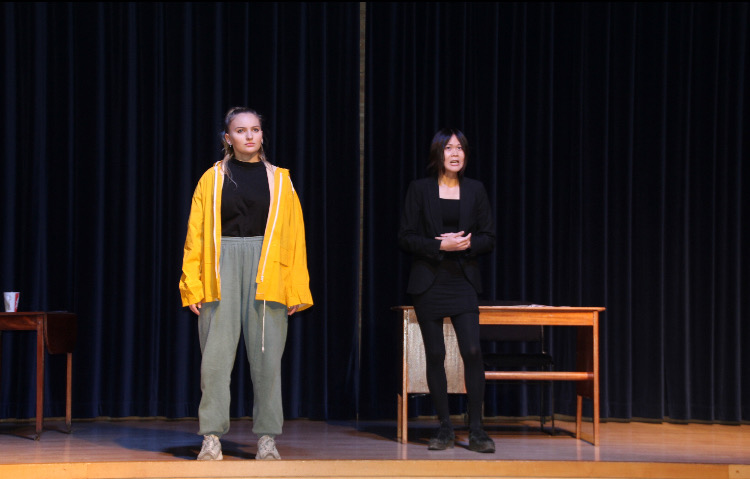For a fan of opera, an art form so often defined by elitism, tradition and outdated cultural norms, it was a refreshing change to see three short student-composed operas, about themes as diverse as the rise of the far right, workplace harassment and the Hong Kong crisis, performed at the first Oxford Contemporary Opera Festival at St Hilda’s earlier this week. Organised by Exeter music finalist Zerlina Vulliamy, the festival has the goal of ‘presenting a spectrum of what modern opera can offer’, with a focus on ‘contemporary, accessible storylines’.
Indeed, from the opening of the night’s first opera, Hani Elias’ Camus-inspired The Outsiders, it was clear that this festival would push the boundaries of what opera could offer as a genre. Some striking red lighting cast the audience’s attention upon the protagonist Moselle, a falsely accused female defendant and descendant of Simone de Beauvoir, and an offstage male voice ominously described the charge against her, with the defendant herself pointedly remaining silent. These same themes of patriarchal alienation were again brought to vivid musical life in the chaotic vocal trio made up of Moselle’s girlfriend and a second loyal advocate, and an ominous male ‘Judge’, emphasising powerfully the isolation of women and the impenetrability of political power – this effect was enhanced by some imaginative staging, with the women mixed in with the audience and the man high above on a balcony (and also conducting the band). A memorable, comic yet sobering feature of the opera was the insertion of several spoken Trump quotes into the Judge’s arias, such as the ‘nasty woman’ speech, giving the opera a refreshing grounding in reality and extending its scope to include the general isolation felt by those alienated in any way from a far-right political climate.
The idea of using opera to comment meaningfully on contemporary issues was continued to great effect in Vulliamy’s own composition Susanna, a modern transferal of Mozart’s The Marriage of Figaro, the classic tale of oppressed servants standing up against their amoral aristocratic master, to a modern office. Susannatransferred the powerful-powerless dynamic to a typical #MeToo situation, with Mozart’s Susanna now an ambitious office worker receiving unwanted sexual advances from her boss and being subsequently blamed by her co-worker and love interest Figaro for being ‘the boss’ favourite’ and using sex as a means to power. Though perhaps the most traditional musically speaking of the three operas, Susannademonstrated the unique ability of the operatic aria to convey a character’s vulnerability and emotional journey; Susanna’s final aria, carried beautifully by Tamsin Sandford-Smith’s expressive and versatile soprano, believably depicted the all-too familiar emotional narrative of a victim of sexual harassment, from despair and questioning her own autonomy (‘my body, my career, how much of it was mine?’), to realisation that she is not to blame for others’ action and resolve to change her situation with the aid of Figaro. Also striking in the piece was its able transferal of the source material’s themes and characters to a modern setting; Susanna’s exuberant energy and Mozart’s frantic musical motifs were epitomised in Susanna’s bouncy statement in the opening scene that she is ‘the last one left’ in the office, and Figaro’s foolish-yet-endearing persona opposite Susanna’s ‘straight man’ was a dynamic which came across as strongly in this opera as it does in Mozart. Moreover, it would be remiss not to mention that Vulliamy did not do away with the comic value of Mozart’s original, but rather updated it – an operatic soprano’s reaction to receiving a dick pic was a surprisingly yet very welcome and unfortunately familiar moment to see depicted on stage!
Perhaps slightly less convincing was Israel Lai’s Bou6, a reflection on the current crisis in Hong Kong and on dictatorship and rioting in general. Though the themes were a powerful and appropriate fit for the genre given the dramatic moments that opera can easily portray, and the singers very talented, especially Zhao Ng’s formidable personification of Tyranny, the range of scenes and ideas that the composer tried to incorporate (namely the clash of idealism and authority, the reaction to the death of a young protestor and the ‘wake-up call’ received by a tyrant about the reality of youth rebellion) were perhaps too ambitious for such a short piece. Additionally, while the philosophical ideas expressed in the libretto were often eloquent, most notably the climax of ‘there is no riot, only tyranny’, a quote from a real Hong Kong protest banner, sometimes the orchestrations were so heavy as to overwhelm the audibility of the singers expressing these ideas.
Nevertheless, all three operas were sophisticated musical reflections on contemporary issues, and strong promotions of opera as a socially relevant and emotionally powerful art form.



